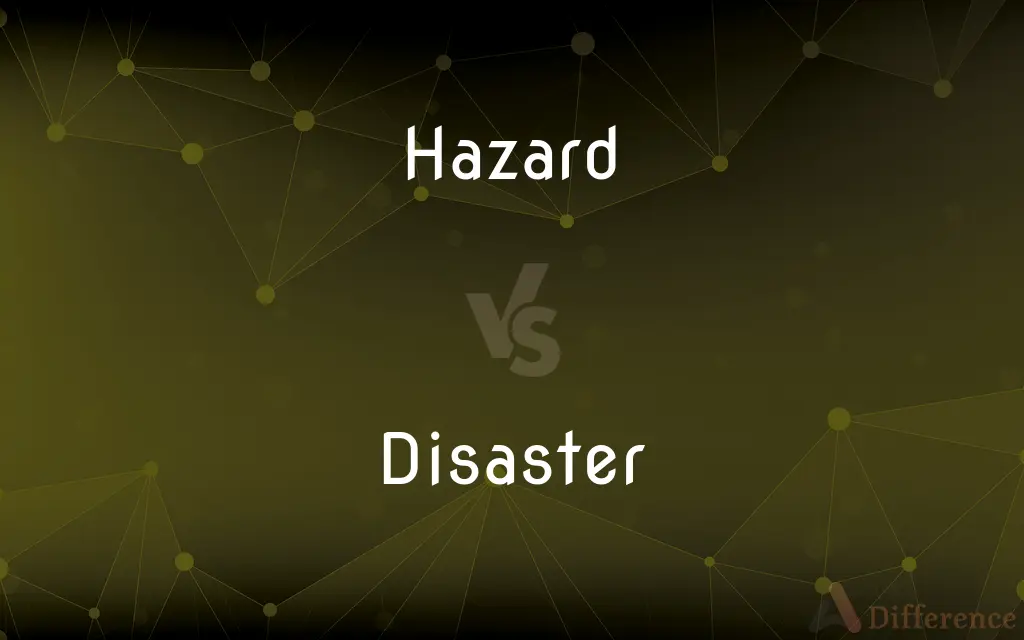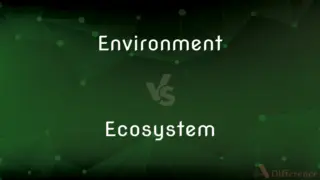Hazard vs. Disaster — What's the Difference?
Edited by Tayyaba Rehman — By Maham Liaqat — Updated on April 15, 2024
Hazard refers to a potential source of harm or adverse effect, whereas a disaster is the realization of these hazards causing significant damage or disruption.

Difference Between Hazard and Disaster
Table of Contents
ADVERTISEMENT
Key Differences
A hazard represents a potential threat that might lead to an adverse event, such as a chemical spill or an earthquake. On the other hand, a disaster describes the actual occurrence of such adverse events when they cause significant harm to life, property, or the environment. Hazards are often identified as part of risk assessments to prevent the potential disasters they might cause.
Hazards can be natural, technological, or human-induced, involving conditions or scenarios that have the potential to cause injury, death, or environmental damage. Whereas disasters are the instances when these potential risks turn into actual emergencies or catastrophes that require immediate response and mitigation efforts.
The scale and predictability of hazards can vary; some are small and manageable, while others are vast and unpredictable. On the other hand, disasters are typically large-scale events that result in significant need for emergency services, aid, and reconstruction efforts.
In terms of preparedness, hazards are what emergency management professionals plan for in an effort to mitigate potential damage. Disasters, on the other hand, test these preparations and the resilience of communities and systems affected by the realized hazards.
Understanding the link between hazards and disasters is crucial for effective disaster risk reduction. While hazards are inherent risks that might or might not materialize, disasters are the unfortunate realization of these hazards, often amplified by a lack of adequate preparedness or mitigation strategies.
ADVERTISEMENT
Comparison Chart
Definition
A potential source of harm or risk.
A significant event causing damage.
Types
Natural, technological, human-induced.
Natural, technological, complex emergencies.
Scale
Can vary, often smaller scale.
Typically large-scale and damaging.
Predictability
Varies, often predictable through risk assessments.
Often sudden, though some can be anticipated.
Management Focus
Prevention and mitigation.
Response and recovery.
Compare with Definitions
Hazard
A risk that someone or something usually presents.
Smoking is a health hazard.
Disaster
A situation where large-scale adverse impact occurs.
The hurricane was a disaster, requiring massive relief efforts.
Hazard
A source of danger that might not be immediate.
Radiation from waste materials is a long-term health hazard.
Disaster
A state of misfortune that results in severe consequences.
The flood was a disaster for the farming community.
Hazard
A potential threat that could cause injury or damage.
Icy roads are a serious hazard for drivers.
Disaster
A sudden event, such as an accident or a natural catastrophe, that causes great damage.
The earthquake was a disaster, destroying numerous homes.
Hazard
A condition with the potential for causing an undesirable consequence.
The chemical plant near the river poses a hazard to the local ecosystem.
Disaster
Any unfortunate event that brings about great damage or loss.
Losing historical artifacts in the fire was a disaster for the museum.
Hazard
Anything that can cause harm under certain conditions.
Open electrical wires are a hazard in any workplace.
Disaster
An event resulting from Earth processes or human activities that causes significant disruptions.
The chemical spill was a disaster for the local river ecosystem.
Hazard
A hazard is a potential source of harm. Substances, events, or circumstances can constitute hazards when their nature would allow them, even just theoretically, to cause damage to health, life, property, or any other interest of value.
Disaster
A grave misfortune.
Hazard
A chance of being injured or harmed
Space travel is full of hazards.
Disaster
A disaster is a serious problem occurring over a short or long period of time that causes widespread human, material, economic or environmental loss which exceeds the ability of the affected community or society to cope using its own resources. Developing countries suffer the greatest costs when a disaster hits – more than 95% of all deaths caused by hazards occur in developing countries, and losses due to natural hazards are 20 times greater (as a percentage of GDP) in developing countries than in industrialized countries.
Hazard
Risk or danger
A high degree of hazard.
Disaster
An occurrence causing widespread destruction and distress; a catastrophe.
Hazard
A possible source of danger
This room is a fire hazard.
Disaster
(Informal) A total failure
The dinner party was a disaster.
Hazard
(Games) A game played with dice that is a forerunner of craps and was especially popular in England in the 1600s and 1700s.
Disaster
(Obsolete) An evil influence of a star or planet.
Hazard
(Sports) An obstacle, such as a sand trap, found on a golf course.
Disaster
An unexpected natural or man-made catastrophe of substantial extent causing significant physical damage or destruction, loss of life or sometimes permanent change to the natural environment.
People would suffer disasters when society's morality degenerates.
Hazard
(Archaic) Chance or an accident.
Disaster
An unforeseen event causing great loss, upset or unpleasantness of whatever kind.
Hazard
To expose to danger or risk.
Disaster
An unpropitious or baleful aspect of a planet or star; malevolent influence of a heavenly body; hence, an ill portent.
Disasters in the sun.
Hazard
To venture (something)
Hazard a guess.
Disaster
An adverse or unfortunate event, esp. a sudden and extraordinary misfortune; a calamity; a serious mishap.
But noble souls, through dust and heat,Rise from disaster and defeatThe stronger.
Hazard
To express at the risk of denial, criticism, or censure
"The wise young captain ... hazarded to the lieutenant-colonel that the enemy's infantry would probably soon attack the hill" (Stephen Crane).
Disaster
To blast by the influence of a baleful star.
Hazard
The chance of suffering harm; danger, peril, risk of loss.
He encountered the enemy at the hazard of his reputation and life.
Disaster
To bring harm upon; to injure.
Hazard
An obstacle or other feature which causes risk or danger; originally in sports, and now applied more generally.
The video game involves guiding a character on a skateboard past all kinds of hazards.
Disaster
A state of extreme (usually irremediable) ruin and misfortune;
Lack of funds has resulted in a catastrophe for our school system
His policies were a disaster
Hazard
(in driving a vehicle) An obstacle or other feature that presents a risk or danger that justifies the driver in taking action to avoid it.
Disaster
An event resulting in great loss and misfortune;
The whole city was affected by the irremediable calamity
The earthquake was a disaster
Hazard
(golf) A sand or water obstacle on a golf course.
Disaster
An act that has disastrous consequences
Hazard
(billiards) The act of potting a ball, whether the object ball (winning hazard) or the player's ball (losing hazard).
Hazard
(historical) A game of chance played with dice, usually for monetary stakes; popular mainly from 14th c. to 19th c.
Hazard
Chance.
Hazard
(obsolete) Anything that is hazarded or risked, such as a stake in gambling.
Hazard
(tennis) The side of the court into which the ball is served.
Hazard
(programming) A problem with the instruction pipeline in CPU microarchitectures when the next instruction cannot execute in the following clock cycle, potentially leading to incorrect results.
Hazard
To expose to chance; to take a risk.
Hazard
To risk (something); to venture, incur, or bring on.
I'll hazard a guess.
Hazard
A game of chance played with dice.
Hazard
The uncertain result of throwing a die; hence, a fortuitous event; chance; accident; casualty.
I will stand the hazard of the die.
Hazard
Risk; danger; peril; as, he encountered the enemy at the hazard of his reputation and life.
Men are led on from one stage of life to another in a condition of the utmost hazard.
Hazard
Holing a ball, whether the object ball (winning hazard) or the player's ball (losing hazard).
Hazard
Anything that is hazarded or risked, as the stakes in gaming.
Hazard
Any place into which the ball may not be safely played, such as bunkers, furze, water, sand, or other kind of bad ground.
Hazard
To expose to the operation of chance; to put in danger of loss or injury; to venture; to risk.
Men hazard nothing by a course of evangelical obedience.
He hazards his neck to the halter.
Hazard
To venture to incur, or bring on.
I hazarded the loss of whom I loved.
They hazard to cut their feet.
Hazard
To try the chance; to encounter risk or danger.
Hazard
A source of danger; a possibility of incurring loss or misfortune;
Drinking alcohol is a health hazard
Hazard
An unknown and unpredictable phenomenon that causes an event to result one way rather than another;
Bad luck caused his downfall
We ran into each other by pure chance
Hazard
An obstacle on a golf course
Hazard
Put forward, of a guess, in spite of possible refutation;
I am guessing that the price of real estate will rise again
I cannot pretend to say that you are wrong
Hazard
Put at risk;
I will stake my good reputation for this
Hazard
Take a risk in the hope of a favorable outcome;
When you buy these stocks you are gambling
Common Curiosities
What role do humans play in creating hazards?
Human activities can create hazards through environmental degradation, technological failures, and unsafe practices, which may lead to disasters.
Can a hazard become a disaster?
Yes, if a hazard materializes and causes significant impact, it becomes a disaster.
Is a pandemic considered a hazard or a disaster?
A pandemic is considered a disaster because it is a large-scale adverse health event caused by the biological hazard of disease spread.
How do governments prepare for disasters?
Governments prepare for disasters through risk assessments, emergency planning, public education, and by setting up response and recovery resources.
How can we reduce the impact of disasters?
By identifying potential hazards, improving preparedness, and implementing effective mitigation strategies, we can reduce the impact of disasters.
What is disaster risk reduction?
Disaster risk reduction is the systematic approach to identifying, assessing, and reducing risks of disaster through prepared measures.
What is the difference between a hazard and a disaster?
A hazard is a potential threat or condition that can lead to a disaster, which is the actual occurrence of an event causing significant harm or damage.
Are all disasters predictable?
Not all disasters are predictable; while some, like hurricanes, can be forecasted, others, like earthquakes, often occur suddenly.
How do insurance companies use the concept of hazard?
Insurance companies assess hazards to determine risk levels and insurance premiums, aiming to financially protect against potential disasters.
How does climate change affect hazards and disasters?
Climate change can increase the frequency and intensity of certain natural hazards, potentially leading to more severe disasters.
What measures can individuals take to protect themselves from hazards?
Individuals can stay informed, adhere to safety guidelines, and participate in local preparedness training to protect themselves from hazards.
What are some examples of technological hazards?
Technological hazards include chemical spills, nuclear reactor failures, and industrial accidents.
What is the role of emergency services during a disaster?
Emergency services play a crucial role in responding to disasters by providing immediate aid, rescuing affected individuals, and managing the crisis.
Can better building standards reduce the impact of disasters?
Yes, implementing and adhering to higher building standards can significantly reduce the damage caused by disasters such as earthquakes and storms.
How do education and training help in managing disasters?
Education and training improve individual and community resilience by equipping people with the knowledge and skills to effectively respond to and recover from disasters.
Share Your Discovery

Previous Comparison
Environment vs. Ecosystem
Next Comparison
Despite vs. AlthoughAuthor Spotlight
Written by
Maham LiaqatEdited by
Tayyaba RehmanTayyaba Rehman is a distinguished writer, currently serving as a primary contributor to askdifference.com. As a researcher in semantics and etymology, Tayyaba's passion for the complexity of languages and their distinctions has found a perfect home on the platform. Tayyaba delves into the intricacies of language, distinguishing between commonly confused words and phrases, thereby providing clarity for readers worldwide.














































